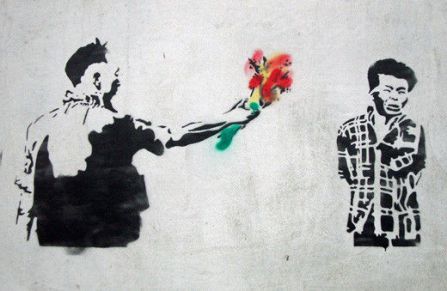This week my sermon will be about the idea that we are invited to grasp loving action as the deepest “should” in our life, even -- or especially -- when other people fail to live up to those “love your neighbor” ideals.

If you don’t have time to listen to the sermon, or (like me) prefer reading to listening, here are a few of the images and stories that I hope illuminate the heart of the scripture readings we’ll hear in church. (Romans 13:8-14 and Matthew 18:15-20, in case you want to follow the logic.)
“What makes someone a good Christian?” a woman asked me this week. She is humble and kind; she was not asking because she wants a measurement for judgment, but rather because she is really struggling with who she can trust. I don’t presume to know the “measuring stick” myself, and Jesus says really clearly that we are not to judge, but I think we’ve been given some help from our scriptures about where we should focus and refocus our efforts and attention, again and again:love. According to Romans, it is the only obligation that matters, the most important trait of our lives. This love has two feet, love of God and love of neighbor. Today the focus is on love of neighbor, and what that looks like, especially when humans act like humans and hurt one another and there is conflict and pain.
We run into trouble with the word “love” in English, because for us English-dominant speakers the word first points to an emotion, not an action. Other texts confirm that God cares about our interior life, too -- our anger and our coveting and our jealousy -- but today we’re invited to focus primarily on loving action.
Let’s take a deep dive into what this can look like: I have been pondering the loving action of Al Letson ever since I heard about it on NPR a little over a week ago. Imagine: Here is a reporter, a black man, who chooses to cover a white man with his own body to protect him, yelling “stop!” to those still attacking. He acts as a human shield upon the body of Keith Campbell, a conservative blogger who is being attacked by antifa members, simply because Letson sees the humanity of the man on the ground, simply because he’s afraid the man was going to be killed. This is an arresting and incredible example of loving action in the midst of conflict and pain, a living witness of the law of love brilliantly interrupting old and tired human expectations. I want to go to hear Letson’s father preach and teach, if he is still a minister, because he obviously succeeded in teaching his son to love neighbor as self in a way that transcends not only greeting card sentiments but also basic human fear.
We all know we don’t need to go to a protest to experience conflict. We miss the mark (i.e., we sin) in our own families, in our own communities. And then what are we to do, when this inevitably happens? What kind of loving action is asked of us?
Here’s a story for today’s gospel. A big extended family lives together: grandmother, parents, kids. A middle school aged girl sneaks into grandma’s room and takes her most beautiful earrings for the Friday night dance. Playing with her earring in the lawn outside the school, she loses one. Her younger brother tattles. The grandmother is hurt, angry. But she waits, and she prays. She goes to the girl a couple nights later. Tell me about what happened on Friday. Where are my earrings? Still, denial. I didn’t do it! John is lying. I have no idea where they are. Instead of screaming, digging her heals in deeper, the grandmother waits a day and then invites the girl’s beloved father to join her. We know what happened. What’s going on? We want you to be honest about this because we love you, because this is important. Maybe there is some form of justice, “consequences,” but really these are beside the point. The grandmother and father are most concerned with the girl, want the relationship to be healed through honesty and forgiveness. They know that to live with the lie would be unhealthy for the whole family. And so they pursue the girl, not with anger, but with love, so that she might be restored, regained.
This is a wise grandmother. But it is not unthinkable, right? It seems to me that Jesus is inviting us to treat one another like this when someone in our lives is missing the mark in a way that really matters. Our deepest desire in this movement is not judgment, but to regain a brother or sister to a family, a community. The church at its best is like a family that strives to be known not by its beautiful house, or its good name, or its traditional profession, but by its deep and surprising love, even in the midst of conflict. We’re still working on it.
